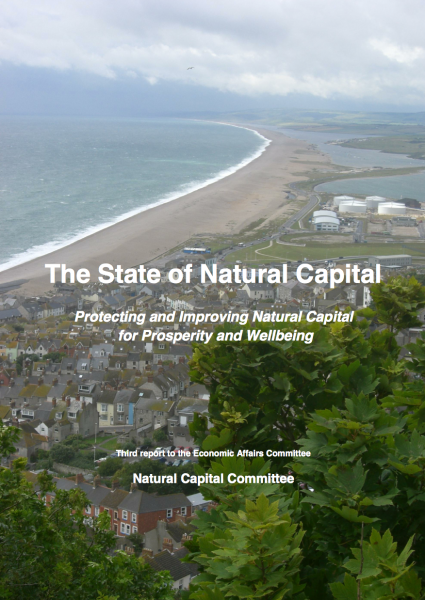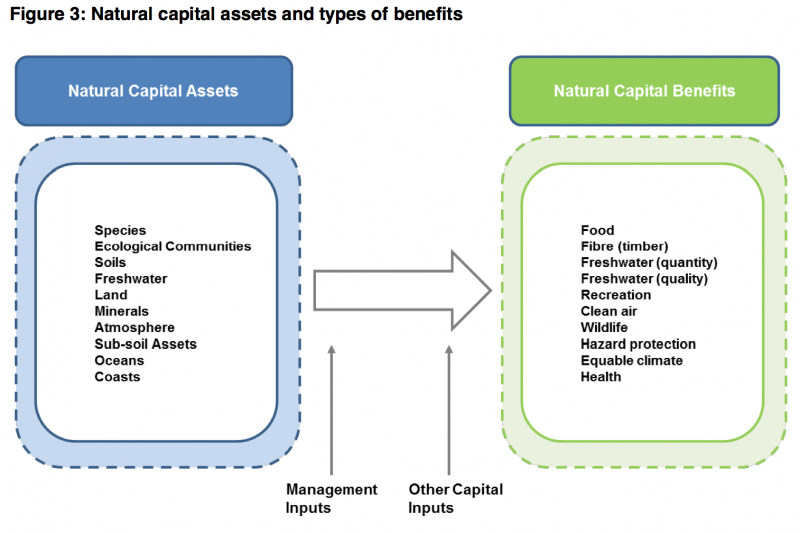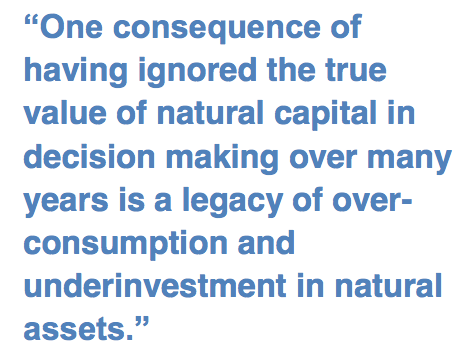 The Natural Capital Committee’s (NCC) third and final State of Natural Capital report calls for a comprehensive strategy and corresponding 25-year plan to protect and improve England's natural capital that includes natural capital accounting and better economic valuation.
The Natural Capital Committee’s (NCC) third and final State of Natural Capital report calls for a comprehensive strategy and corresponding 25-year plan to protect and improve England's natural capital that includes natural capital accounting and better economic valuation.
The report says the government should work with the private sector and non-governmental organizations to develop the strategy, and that it should be given effect in legislation with regular reports on progress made to Parliament.
It also presents a series of potential environmental investments that offer strong economic returns such as:
- Peatland restoration, which would deliver net benefits of £570 million (~$867 million) over 40 years in carbon values alone.
- Woodland planting near towns and cities, which could generate net societal benefits in excess of £500 million (~$760 million) per year.
- Creating more urban greenspaces—which provide recreational value and improvements in physical and mental health—are estimated to reduce health costs alone by £2.1 billion (~$3.2 billion).
- Creating intertidal habitats that provide a wide range of benefits including coastal flood protection, carbon storage, areas for wildlife and the provision of nursery grounds for important commercial fish stocks.
- Increased urban air quality can reduce the number of premature deaths and reduced productivity, which together costs the economy at least £20 billion (~$30.4 billion) per year.
The 58-page report, “The State of Natural Capital: Protecting and Improving Natural Capital for Prosperity and Wellbeing,” released on January 27, 2014, lays out a three-pronged approach to stop the long-term decline of England’s natural capital, sustain economic growth, and meet the British Government's objective of being the "first generation to leave the natural environment in a better state than it inherited":
1. Lay the foundations or key “building blocks” to underpin the strategy, such as the measuring and monitoring of changes in natural capital, building comprehensive natural accounts at national and corporate levels, and identifying natural assets at greatest risk.
2. Make carefully planned investments in natural capital targeted at the best locations that will deliver significant value for money and generate the highest economic returns.
3. Secure reliable and long-term financing from the public and private sectors.
One of the specific recommendations is that “the Government should urgently step up action to ensure that the Office for National Statistics (ONS) and the Department for Environment, Food and Rural Affairs (Defra) meet the target of incorporating natural capital into the national accounts by 2020. This should include a national balance sheet of the value of our natural assets, estimates of the depreciation of those assets (where this occurs) and a corresponding redefinition of the way in which income and savings are measured in national accounts.”
“I cannot stress strongly enough how important it is that these recommendations are followed through; provided we have the data and the accounts, real progress can be made,” said NCC Chairman and University of Oxford Economics Professor Dieter Helm in the report’s introduction.
“There is now a great opportunity to improve the wellbeing and prosperity of both urban and rural populations and restore some of the natural capital that has been lost. This will enhance prospects for long-term sustainable growth and therefore bequeath to the next generation a set of properly maintained and enhanced natural assets,” said Helm.

The NCC is an independent advisory body set up in 2012 to provide advice to the government on how to ensure England’s natural capital (forests, rivers, land, minerals and oceans) is managed efficiently, unlocking opportunities for sustained prosperity and wellbeing. The NCC formally reports to the Economic Affairs Committee, and is supported by a Secretariat based in the UK’s Department for Environment, Food and Rural Affairs (Defra).
The committee had an initial three year fixed term that was extended for six months to September 2015 so the NCC can provide advice to incoming ministers following the May 2015 U.K. General Election and receive a response to this third State of Natural Capital report. Ultimately, politics plays a major factor in translating the committee’s advice into practice on the ground.
In April 2013, the NCC published its first State of Natural Capital report, which reviewed evidence on trends and drivers affecting natural capital in England, and proposed some options to measure and value changes in natural capital in order to better manage it to produce economic benefits.
The Committee’s second report, published in March 2014, presented a framework for assessing which of the benefits derived from natural capital in England might be at greatest risk and estimating the potential economic gains from their recovery. It also presented the initial argument that a clear program of prioritized action is needed to restore critical natural assets.

"This third State of Natural Capital makes absolutely clear the opportunities to be had by investing in natural capital.... The report also points to a need to recognize natural capital as part of our national infrastructure and to plan for its provision accordingly through carefully identified investments in nature and clear thinking, involving both the public and private sectors, on how these improvements can be implemented and financed," said Giles Atkinson, one of the eight members of the Committee and a professor of environmental policy at the London School of Economics. Atkinson is also a member of the Wealth Accounting and the Valuation of Ecosystem Services’ (WAVES) Policy and Technical Experts Committee.
Between now and September 2015 the Committee will produce a series of working papers and other outputs that go into more depth on many of the issues in the report.
